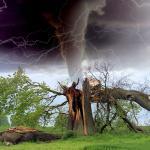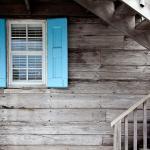If you're looking for information on protecting your home from storm damage, then you're an informed homeowner.  Storms can not only destroy the house you've turned into a home over the years with precious memories, but it can also increase your insurance rates. Not to mention, storm damage can displace you in an instance.
Storms can not only destroy the house you've turned into a home over the years with precious memories, but it can also increase your insurance rates. Not to mention, storm damage can displace you in an instance.
While tornados and hurricanes can cause heavy damage, there are things that you can do in order to reduce the impact. By taking measures now, you will be ready for any emergencies that may happen.
Nearby Flying Objects
During a storm with heavy winds such as those produced by tornados and hurricanes, you will surely have flying objects traveling long distances which may hit your home. This fact, however, should not sway you from eliminating this problem from your own yard. If you've got lawn furniture, barbecue grills, and other objects in your yard, it would be wise to secure them in your storage shed or within your home.
Flying objects can slam through your windows and shred the siding on your home. They can even end up inside of the home where you and your loved ones can be injured. If you are unable to relocate these objects, then you should do your best to secure them in place, taking into consideration that the winds may be strong enough to pull things from the ground. In addition, don't forget the items connected to the exterior of your house such as television antennas and satellite dishes.
Protect Your Windows
Windows tend to be the first thing to be damaged in a heavy storm. Not just flying objects can damage windows, but winds at high speeds can also destroy them with little effort.  5/8th-inch exterior grade plywood at the bare minimum should be used on the outside frame of the windows, making sure to secure them tightly with nails.
5/8th-inch exterior grade plywood at the bare minimum should be used on the outside frame of the windows, making sure to secure them tightly with nails.
You'll often see such plywood boarding up windows and doors in vacant homes, primarily because it works. Not only will it protect your windows, but it will help keep out any potential looters taking advantage of the storm conditions to raid homes.
Trim Your Trees
Weak or dead trees can be a serious issue for your home during high winds. Small limbs can become flying objects, and weak trees can fall on your house. Look for trees that are close to your home, or are leaning in that direction. You should use a saw and eliminate branches or the entire tree if necessary. If you don't have experience cutting or trimming trees, contact a professional.
Fight off Flooding
If your area is prone to flooding or nearby a levy, you can use heavy sandbags to help reduce flood damage. There are also barriers available for purchase specially designed to ward off floods. If you have a storm on the way and no time to wait for an order, you can use trash bags filled with sand or water. Keep in mind that a trash bag with water may leak or burst if it were hit with a flying object or extreme winds.
Make sure to check your basement and foundation for cracks, and seal what you can. This will help eliminate potential flooding issues. If you have some time, you may be able to use some fast-drying concrete. It will not be the most effective solution as it won't have time to cure, but it can help.
Snow Storm Damage
Tornados and hurricanes aren't the only storm issues that homeowners face. Severe snowstorms can be devastating too. One of the biggest issues with snowstorms is weight. Mainly the weight on roofs. When safe, you should try to keep roof access clear and knock down any built-up snow concentrated in small areas.
Heavy snow on a roof can cause the roof to cave in. During a heavy snowstorm, the last thing you want is a caved-in roof. It's unlikely that anyone would be willing to come by and fix things during a storm. Such repairs would be counter-intuitive anyway and most certainly dangerous for the person on the roof.
Are you on the path to protecting your home from storm damage?
If you've done all of the above, you are significantly better off than before. But don't stop there. Only you know your home intimately, and there may be issues you can resolve. Regardless, I hope these tips have helped you to protect your home so that you and your family may enjoy it for years to come.